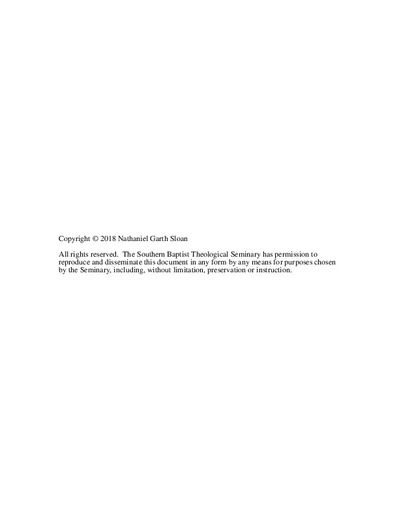| dc.description.abstract | Nathaniel Garth Sloan, D.Miss.
The Southern Baptist Theological Seminary, 2018
Chair: Dr. Jeff K. Walters
Pre-field assessment and development are proven tools to help missionary candidates better prepare for life and ministry overseas. There is no better place to do this assessment and development than in the context of the local church. Chapter 1 lays the framework for the rest of the dissertation by providing an apologetic to the centrality of the local church and giving a basic overview of what will be covered in the dissertation. Chapter 1 then provide definitions to key concepts, addresses limitation and delimitations, and then lays out the methodology of research.
Chapter 2 provides a biblical and historical basis for the sentness of God and the sentness of the local church. This Trinitarian sending shows that God the Father sent the Son, the Father and Son sent the Spirit, and the Triune God sends the church out on a mission of redemption. Chapter 2 goes on to show the sentness of the local church as displayed throughout history from Acts 2 through the current Sending Church Movement. This theological understanding of the mission Dei, the mission of God, is essential to understanding and valuing the local church’s role in global missions, specifically assessment and development.
Chapter 3 starts by answering the question of why the local church matters in the assessment and development of pre-field missionaries. The chapter then discuss the results of a twelve-question interview given to nine known and respected sending churches in North America. The results of these interviews were analyzed, discussed, and observations are made. Finally, the chapter discussed best practices of assessment and development seen in the churches interviewed.
Chapter 4 considers the findings of chapter 3, as well as the current literature available on missionary assessment and development, and then proposes a model of assessment and development that can be used by leaders in local churches. This proposed model includes the methodology, processes, tools, and best practices needed for assessing and developing prospective missionaries within the local church. | en_US |

